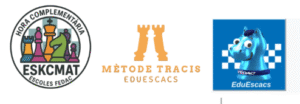
Summary
Educational chess has traditionally been viewed as a supplementary tool to reinforce specific curricular content such as arithmetic, geometry, or spatial reasoning. While this perspective is valid and may offer motivational benefits, it significantly underestimates the transformative potential of chess as a comprehensive pedagogical resource.
This article presents an evidence-based alternative: chess as a vehicle for holistic cognitive training, with a special focus on the development of executive functions and metacognitive skills. Successfully implemented in the FEDAC schools of Catalonia through the EduEscacs program and the TRACIS methodology , this approach has demonstrated tangible and lasting benefits. Those benefits include such key areas such as self-regulation, sustained attention, and informed decision-making. All of these contribute to meaningful improvements in students’ overall learning processes.
, this approach has demonstrated tangible and lasting benefits. Those benefits include such key areas such as self-regulation, sustained attention, and informed decision-making. All of these contribute to meaningful improvements in students’ overall learning processes.
The Initial Misstep: Chess as Curricular Reinforcement
Many educational chess programs have adopted a limited vision of the game. Such programs use chess as a pretext to teach curricular content such as numbers, basic operations, or environmental studies. This approach, while methodologically diverse, often fails to justify the investment of instructional time unless it fosters the development of core cognitive competencies.
A common misconception is that simply playing chess inherently leads to cognitive growth. Such programs are often led by educators or instructors with little training in neuroeducation or the pedagogy of thinking. They typically center around teaching the rules of the game or using chess as a thematic resource. However, recent findings in cognitive neuroscience and educational psychology confirm that not all implementations of chess are educationally effective. Without a structured, theory-based model aimed at developing transferable cognitive skills, the educational impact remains minimal.
The Alternative: Chess as a Tool for Executive Function and Metacognitive Training
Executive functions–including planning, inhibitory control, working memory, sustained attention, and cognitive flexibility–are high-order mental processes essential for learning, self-regulation, and problem-solving. Research shows that these functions are stronger predictors of academic success than IQ or socioeconomic background (Zelazo, Diamond, Blair, among others).
Metacognition–the capacity to reflect on and regulate one’s own thinking–plays a complementary role by promoting autonomy, self-monitoring, and strategic adaptation in learning. Students who develop metacognitive skills are better equipped to identify errors, adjust behaviors, and achieve their goals.
The EduEscacs program is built on the belief that chess, when approached intentionally and pedagogically, offers an ideal context to cultivate both executive and metacognitive capacities. Chess sessions are not reduced to free play. Instead, they are strategically designed to activate specific cognitive processes and foster meaningful reflection.
The EduEscacs Model: Five Pedagogical Pillars
- Structured Sessions
- Each session follows a coherent structure involving cognitive activation, tactical challenges, guided reflection, and meaningful play—ensuring a rich and intentional learning experience.
- TRACIS Methodology
- An acronym for Tactics, Reflection, Autocontrol, Change of Plan, Initiative, and Simulation, TRACIS provides a practical and theoretically grounded framework for the systematic development of executive functions.
- Qualitative Assessment of Executive Progress
- Instructors monitor progress through observation and formative assessment tools that highlight students’ evolving strategies, behaviors, and cognitive patterns.
- Cooperative Learning in Heterogeneous Pairs
- Pair-based work fosters empathy, dialogue, perspective-taking, and shared metacognitive reflection, creating a socially enriched learning environment.
- Transfer to Broader Learning Contexts
- The model links skills developed through chess to other academic areas, facilitating real-world application and deep learning. This especially benefits students with special educational needs or those in vulnerable environments.
Documented Impact and Emerging Evidence
After several years of implementation, the EduEscacs model has yielded observable improvements in participating students, including:
-
-
- Enhanced sustained attention during academic tasks
- Greater emotional and behavioral self-regulation, particularly under stress or frustration
- Improved planning abilities and cognitive flexibility when facing novel or complex challenges
- Increased self-awareness, reflective thinking, and evidence-based decision-making.
-
These outcomes have been recognized by teachers, families, and external evaluators alike.
Ongoing research is now working to provide quantitative validation and expand the scientific grounding of the approach.
A Call for a Paradigm Shift
Educational chess must not remain a decorative or optional add-on. It has the potential to become a transformative, structural component of an inclusive, future-focused education that values deep thinking and cognitive autonomy. This approach does not emerge from elite chess circles or well-known authors. It emerges from real classrooms with committed educators and diverse students. It is an approach where each move, mistake, and reflection becomes an opportunity cultivate life-long learning skills.
A Final Call to Action
We urge educational institutions, program coordinators, and policy makers to rethink the role of chess in schools:
-
-
- It’s not about using chess to create more schooling.
- It’s about using chess to create better schools.
-
 About the Author
About the Author
Ramón Pérez Rodríguez holds degrees in Primary Education from the University of Girona. Also, a degree in Psychopedagogy from the Open University of Catalonia. He is Coordinator and Teacher of the Educational Chess Program “EduEscacs” and the Teaching and Learning Method of Educational and Social Chess “TRACIS” applied to FEDAC Schools in Catalonia. Rodríguez is an educational chess trainer for teachers and professors of the Department of Education of the Generalitat de Catalunya from the School Chess Project. He is also a member of the Chess and Educational Research Observatory of the University of Girona.
